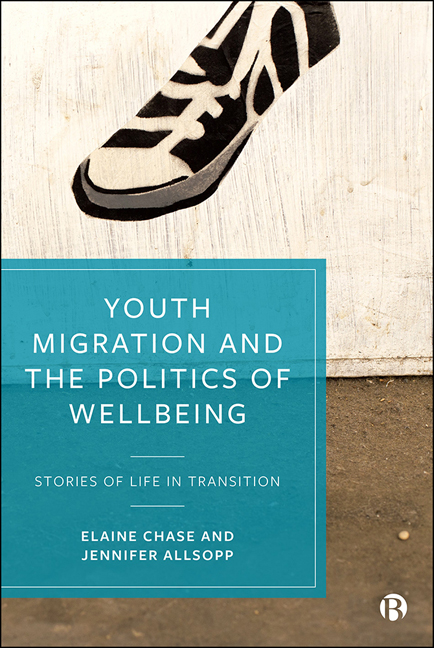Book contents
- Frontmatter
- Contents
- List of Figures
- Acknowledgements
- Foreword
- ‘Future’
- 1 Introduction
- 2 Conceptualizing Wellbeing in the Context of Migration and Youth Transitions
- 3 Capturing Wellbeing in Transition: An Alternative Approach
- 4 ‘Iron Rod’ or ‘Colander’? Welfare Regimes in England and Italy
- 5 The Pursuit of Safety and Freedom
- 6 Legal Integrity and Recognition
- 7 Identity and Belonging
- 8 Constructing Viable Futures as ‘Adults’
- 9 Emotional and Mental Wellbeing
- 10 Friendships, Connections and Relationships
- 11 Transnational Family and Connections
- 12 Conclusion
- Endnotes
- References
- Index
9 - Emotional and Mental Wellbeing
Published online by Cambridge University Press: 21 April 2021
- Frontmatter
- Contents
- List of Figures
- Acknowledgements
- Foreword
- ‘Future’
- 1 Introduction
- 2 Conceptualizing Wellbeing in the Context of Migration and Youth Transitions
- 3 Capturing Wellbeing in Transition: An Alternative Approach
- 4 ‘Iron Rod’ or ‘Colander’? Welfare Regimes in England and Italy
- 5 The Pursuit of Safety and Freedom
- 6 Legal Integrity and Recognition
- 7 Identity and Belonging
- 8 Constructing Viable Futures as ‘Adults’
- 9 Emotional and Mental Wellbeing
- 10 Friendships, Connections and Relationships
- 11 Transnational Family and Connections
- 12 Conclusion
- Endnotes
- References
- Index
Summary
‘The main thing is that if you get refused, the Home Office would like to send you back home. And you can't stop thinking about it even if you take a tablet or anything, so in the end the tablets won't help at all. But the only thing you will think of is that you need to get your documents and settled down and establish your life here. And if they say “no” to you and you keep thinking about, what to do now to get your documents? How to live? Where to get support from? So these are the things you have to do whether you take the tablets or not. And if these things get sorted – you don't need a tablet.’ (Kushan, from Afghanistan)
Introduction
Throughout the book, we have adopted an expansive understanding of subjective wellbeing, situated in young people's lived experiences, one that is inextricably tied to the notion of a viable future and typically a collective rather than an individual pursuit. As noted in other work (Chase et al 2019), much research has focused on the adverse impacts of migration on the mental health of children and young people and the difficulties in identifying and appropriately responding to their mental health needs (Bean et al 2007; Bronstein and Montgomery 2011; Children's Society 2018). Far less attention has been given to how post-migration stressors also adversely affect these young people's mental health (Fazel et al 2012; Li et al 2016; Gentleman 2018). In this chapter, we consider the factors that negatively impact mental wellbeing of migrant young people not so much in terms of presenting symptoms and biomedical responses, but largely as products of systems and structures that are incompatible with their lives and aspirations (see Chapter 8). We highlight how anxieties surrounding the uncertainty of legal situations, indefinite periods of time waiting for decisions and the devastating impacts of receiving a refusal from the state immigration authorities took a significant toll on young people's wellbeing. Even those who were granted secure legal status often aged out of care when struggling with inadequate support or still reeling from the impact of many previous years of precarious living and the barriers this created to being able to move forward with their lives.
- Type
- Chapter
- Information
- Youth Migration and the Politics of WellbeingStories of Life in Transition, pp. 153 - 172Publisher: Bristol University PressPrint publication year: 2020

